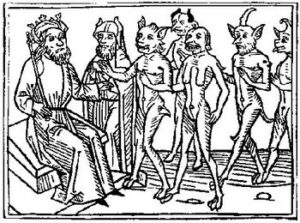“If you hear it told that in one of your cities which Adonai your God is giving you to live in, certain scoundrels have sprung up among you and have drawn away the inhabitants of their city by saying, ‘Let’s go and serve other gods, which you haven’t known,’ then you are to investigate the matter, inquiring and searching diligently. If the rumor is true, if it is confirmed that such detestable things are being done among you, you must put the inhabitants of that city to death with the sword, destroying it completely with the sword, everything in it, including its livestock.”-Deuteronomy 13:13-16
We are in the midst of studying the categories of rebellious individuals Israel was to be on the lookout for once they were settled in the Promised Land.
The third and final example we are given here refers to a person who successfully gets a whole community or congregation to pervert their worship of the Lord by either worshipping false gods, adding paganism to their observances or both.
From Deuteronomy 13:13, we’re presented with a situation of an Israelite town that has already fallen into idolatry.
The dire consequences are that BOTH the instigators and the entire community who fell for this idolatry must be destroyed.
What’s interesting is the original Hebrew used here to describe the rebels who started this trouble.
The original Hebrew is BENE BELIAL which literally means “sons of Belial”.
The Complete Jewish Bible renders BENE BELIAL as “scoundrels” and the NIV simply refers to them as “troublemakers”.
Other Bible versions will call them “base fellows” or some other variation.
However, it is ONLY the King James version of the Bible that is the most faithful to the original Hebrew.
The King James says “the children of Belial”.
What does this mean exactly?
Well, “Belial” is actually a term used to refer to totally degenerate or useless people such as murderers, robbers and rapists whose only goal in life is to cause trouble and hurt people.
The Scripture here is literally calling these rebels who started this mass idolatry “sons of worthlessness“.
So “scoundrel” and “troublemakers” are actually pretty good renderings from the original Hebrew.
We’ll actually find the word BELIAL in other parts of Scripture used as a formal name just like the word “Satan”.
Satan is often used as a formal name but it is also a regular noun that means “adversary”.
Whenever the Bible uses BELIAL as a proper name, it’s the same as how we might refer to the devil as the “Evil One”.
Obviously, the phrase “the evil one” is NOT another formal name for the devil.
All we’re doing is taking a general title and using it in a poetic fashion to refer to someone who embodies a certain attribute whether it be wickedness or whatever.
However, over time, phrases like “the Evil one” can become so common that they actually BECOME alternative proper names.
Now that you’ve been thoroughly educated on what BELIAL means, let’s take a look a famous New Testament passage where this word appears.
“What harmony is there
between Messiah and Belial?
Or what does a believer
have in common with an unbeliever?”
2 Corinthians 6:15
Based on what we just learned, we now know what this passage really means.
We understand that these verses mean “what harmony does a follower of Messiah have with sons of scoundrels or totally antisocial misfits“.




Interesting & informative. This article helps to explain one of terms that many of us ponder about.
Hey Paul, Thanks for reading! I’m glad you found this useful. Be blessed and Shalom!